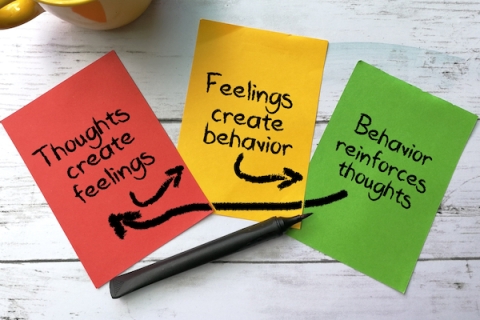

In a varying level of day to day self-consciousness, our thoughts, feelings, and behaviours affect us at the core of everything we do.
Thoughts, feelings and behaviours are at the core of the choices we make, how we feel about ourselves, what and how we pursue things we desire, and also when we set, maintain, and reach our goals.
I don’t know a single person that hasn’t struggled with the ups and downs of exercise motivation (and mood in general) whilst we’ve been in lockdown, myself included. We all know from our experience that our exercise habits are a knock on effect of positive momentum and consistency, combined with knowledge, discipline and hard work. We’re human though, and occasionally, this slips and the momentum shifts in a negative way, leading to lower self worth and confidence, laziness, a new uphill battle to regain a hold on our habits.
Whilst we offer ourselves self-empathy, let’s also look at positively being self aware. Let’s look at that as a pathway to re-motivating ourselves with exercise. Those of you reading may have already made strides in some inner work on your self-awareness. Whether that’s through, for example; cognitive behavioural therapy (CBT), your own methods of self reflection, learning about your own values, exploring what drives you, amongst other routes.
How is it that our thoughts, feelings and behaviours impact the way we approach exercise?
For starters, let’s look at thoughts. If we approach exercise thinking that we absolutely must train today, this can put a pressure on ourselves that isn’t always as helpful as you’d think. We’re likely to self-sabotage if we don’t see the thought through. If when looking at exercise, your thoughts are along the lines of “I’m going to train today because I know I’ll feel great after and that it’ll get the week started right, and I’ll likely then train tomorrow”, then you’re onto a good thing. Self-empathy and accountability!
Our feelings? If we feel that exercise is a chore, again, we may likely not commit. If we think of how good we can feel, whether that’s any of the following; before, during or after exercise, then that’ll motivate us to pick up our home equipment, get to the beach for a cycle or run, or tune into a daily S&R exercise class. We gain a satisfying feeling of self-worth and accomplishment, likely enabling us to continue this and keep that desire strong for that feel-good reward.
How do we behave when things are going well? We typically implement positive and productive behaviours, such as; preparing our meals in advance, setting out a sometimes loose exercise schedule for the coming days or week, or even just having our favourite gym clothing washed and ready to go. If we choose, in our behaviours, to skip a session for the wrong reasons, then that’ll impact negatively on our thoughts, maybe how we perceive ourselves mentally and physically, and this perhaps carries on over the coming days. Equally, after a few sessions, we know we’ll often feel good taking a break, as this’ll allow us to recharge to get going again later in the week. Not training for a day – reframed in two different ways!
As you may have noticed, which is also the purpose of the previously referenced cognitive behavioural therapy, this is no coincidence. They all interlink and greatly impact each other regularly. CBT is used to navigate and tackle our inner perceptions and reality our inner workings outline for us when we struggle with our mental health, offering a welcome acknowledgement that our thoughts, feelings, and behaviours all rotate in a cycle.
A final thought - How can we use this to our advantage?
The continual exploration of self-awareness is a rewarding, sometimes challenging, but intellectually fulfilling journey that has no limit, as we are forever changing. Taking note of your thoughts, feelings, and behaviours may seem like a time consuming task, but it’d likely flow pretty steadily once you begin. I’d recommend writing these down in relation to how you’re currently feeling about exercise, and then how you’d like to feel about exercise. Of course, from there, you could always delve into other areas, if you wish. Self-awareness is the key to growth and positive change.
For example:
Thoughts: “I haven’t trained properly in a while. I’ll eventually get back into it when gyms re-open. I can’t maintain decent shape, so why bother?"
Feelings: “I feel I don’t have a stress relief escapism. I’m putting on a bit of weight and I feel sluggish."
Behaviours: “I might as well order that pizza later. Why not? I don’t have a routine at the moment anyway.”With some inner work, this could be turned into:
T: “I want to phase myself back into regular exercise for when the gym reopens. I may as well pick up that bit of home gym equipment for £30. It’s the same price as two month’s membership that’s been frozen. I want to feel myself again.”
F: “I’m feeling like I’m doing something to help myself. That momentum should continue hopefully. I feel good in myself for making the effort. This is how I want to feel.”
B: “You know what, I’ll leave that pizza later and start preparing my meals a day or two in advance again. I’ll set a reminder to take part in that Sport and rec fitness class tomorrow afternoon too.”

